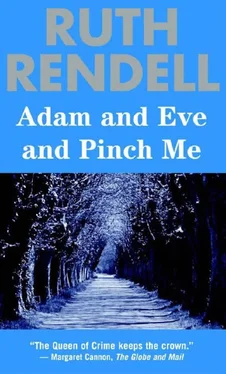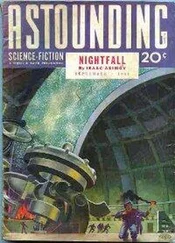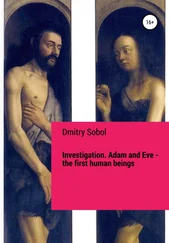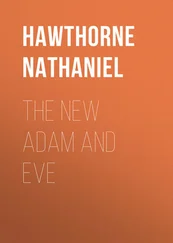Jordan sat on the floor and began howling like a puppy. “I don’t remember the date.” Zillah was driven beyond exasperation now. She wanted to scream and afterward hardly knew how she’d controlled herself “You just have to accept it. What’s it to do with you, anyway?”
“It’s in the public interest. Hadn’t you thought of that? You’re-er, married to an MP, you know.”
“What do you mean, ‘er, married’? I am married. My first husband is dead.”
“Yes,” said Natalie, above Jordan’s squalling. “I’d noticed. I’ll get out of your hair now. There seems to be something wrong with your little boy. Isn’t he well? I’ll let myself out.”
Going down in the lift, she remembered how, a few years back, she’d been in some American city in the Midwest where she’d interviewed a police chief. She was talking to him about crime statistics, various kinds of crime, and she’d asked him about some woman she’d heard of who’d remarried without first being divorced.
“Lady, we have nine murders a week in this city,” he’d said, “and you’re asking me about bigamy .”
But would the police here take the same attitude? Hardly. Jeff had been murdered and his wife or whatever she was had married an MP. Natalie decided not to write anything yet, for she was very much alive to the risks involved in saying in print that Zillah wasn’t legally married, just in case it turned out that she was. Some day soon she’d write a magazine piece about all Jeff’s women; it would be quite sensational. But first she had to go and talk to the Violent Crimes Task Force and at the same time make sure she got in with her exclusive story before anyone else did. In a thoughtful frame of mind she took a cab home.
Zillah had always deplored and clicked her tongue over those people who were up in court for cruelty to children. They belonged, she’d believed, to a different breed from herself. Now, walking up and down with her heavy, screaming, damp child in her arms, as if he were three months rather than three years old, she began to understand. She’d have liked to throw him out of the window. Anything to stop that noise and stem those ever-ready tears.
As she paced, she told herself over and over that things would be all right, it was all right now, because Jerry was dead . You couldn’t be a bigamist if your husband was dead and you’d married again. It was really only a matter of having said she was single when in fact she was a widow, or was soon to be one. She’d never actually said she was divorced until today, she just hadn’t mentioned Jerry at all-had she? She didn’t have to be divorced if her husband was dead. Anyway, none of it was her fault. It was these journalists poking their noses in where they weren’t wanted. And the main thing was she was a widow now, or would have been if she hadn’t married Jims.
To her surprise, Zillah found that Jordan had fallen asleep. He looked lovely when he was asleep, pink-flushed rosebud skin, incredibly long dark eyelashes, damp curls clustering across his forehead. She laid him down on the sofa and eased his shoes off. He rolled away from her and stuck his thumb in his mouth. Peace. Silence. Why had she agreed to get married in that fancy crypt place? Why had she wanted to? She couldn’t remember. Somehow it wouldn’t be so bad if she and Jims had fixed it up in a hotel or a town hall. In a place like that she wouldn’t have had to hear those awful, or perhaps she should say awesome, words. Yet they hadn’t seemed awe-inspiring at the time, she hadn’t really taken them in, she’d been thinking about her dress and what the newspaper photographs would be like… As ye shall answer at the dreadful day of judgment, when the secrets of all hearts shall be revealed, that if either of ye know any just cause or impediment why ye should not be so joined, ye are to declare it . And then there came a bit about as many as are married without declaring it weren’t really married at all, neither is their matrimony lawful . Jims would kill her if he found out his matrimony wasn’t lawful. But it must be lawful, Zillah thought, this unhappy merry-go-round circulating in her head, because her husband was dead and if he hadn’t been dead in the middle of March he soon was, only a few weeks later.
She had to wake Jordan to take him with her and meet Eugenie from school. He whimpered and whined. He was wet too. She took his jeans and underpants off. There was a big smelly stain on Jims’s cream silk sofa. It was terrible having to put a three-year-old into a diaper but she didn’t dare not to. On the way back she’d stop at a chemist and do something she’d sworn she never would do, buy a pacifier to stuff in his mouth. And then she must phone her mother.
For once she was early. The school was a big Georgian house in a lane off Victoria Street. The car parked on a yellow line-but a single line and she wouldn’t be there long-she got out and got Jordan out, and was leaning against its nearside in the sunshine, thinking once more about her marriage service and those words, when a man got out of the BMW behind and came up to her.
“Zillah Watling,” he said.
He was very attractive, tall and thin and fair, with a hooky nose and a nice wide mouth, and dressed in what Zillah thought the most flattering uniform a man could wear, blue jeans and a plain white shirt. The neck was open halfway down his chest and his sleeves were rolled up. She’d seen him somewhere before, long ago, but where she couldn’t remember. “I’m sure I know you but I can’t think…”
He reminded her. “Mark Fryer.” They’d been students together, he said. Then he’d left and Jerry had come…“Is this your boy? I’m here to pick up my daughter.”
“I’m here to pick up mine.”
They exchanged news. Mark Fryer didn’t appear to be a newspaper or magazine reader, for he knew nothing about her marriage to Jims. And he didn’t mention a wife, partner, girlfriend, or anyone that might be the mother of this child who, by a happy coincidence, came down the school steps with her arm round Eugenie.
“Look, we’ve got so much to say to each other, can’t we meet up again? How about tomorrow? Lunch tomorrow?”
Zillah shook her head and silently indicated Jordan.
“Then say Friday morning. We could have coffee somewhere.”
She’d love to. He pointed across the street. How about that place? Zillah thought it rather too near the school for comfort and he named another in Horseferry Road. He waved as she drove off, calling, “I’m so glad we ran into each other.”
Eugenie, in the passenger seat, was staring censoriously at her. “What does he mean, ran into each other? Did he hit our car?”
“It’s just an expression. It means ‘met by chance.’ ”
“He’s my friend Matilda’s father. Did you know that? She says he’s a womanizer and when I said, What does that mean, she said he chases after ladies. Did he chase you?”
“Of course not. You’re not to talk like that, Eugenie, do you hear me?”
But Zillah was already feeling better. It was wonderful what a little male admiration could do. As to the other thing that was always coming back to haunt her, No one can do anything to me , she said to herself, because I’m a widow .
Police officers were back again, talking to Fiona. Although they never came out and said so, she was sure they thought she couldn’t have been deeply affected by Jeff’s death because they hadn’t known each other for very long. It didn’t stop them expecting her to know all about his past, his family, his friends, and everywhere he’d lived since he left art school nine years before.
She’d told them everything she could think of but great gaps existed in her knowledge. His marriage, as she told them, was a closed book to her. She didn’t know where he’d lived with his wife, whether or not she’d ever been in Harvist Road, or the ages of the children. She thought it very hard on her that she couldn’t be left in peace to mourn quietly and by herself-or maybe with Michelle. As for the ex-wife, “I don’t even know where she lives.”
Читать дальше











